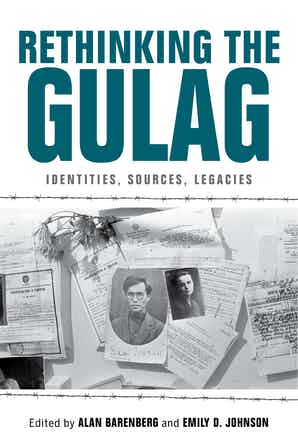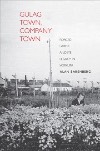Alan Barenberg
Associate Chair
Email: Alan.Barenberg@ttu.edu
Ph.D., University of Chicago
Alan Barenberg specializes in the history of the Soviet Union, with an emphasis on the social and economic history of the 1930s-1970s. His research focuses on a broad range of topics in the economic and social history of the Russian Empire and the USSR. His book, Gulag Town, Company Town: Forced Labor and Its Legacy in Vorkuta (Yale UP, 2014), uses the case of the Arctic community of Vorkuta to resituate the Gulag in the history of the Stalin and post-Stalin eras. Gulag Town, Company Town has been recognized with various prizes, including the Canadian Association of Slavists' Taylor and Francis Book Prize in Slavic, East European, and Eurasian Studies (2015), the Wayne S. Vucinich Book Prize for the most important contribution to Russian, Eurasian, and East European Studies from the Association for Slavic, Eastern European, and Eurasian Studies (Honorable Mention, 2015), and the TTU President’s Book Award (First Prize, 2016).
Dr. Barenberg teaches specialized courses on the Russian Empire, the Soviet Union, as well as surveys of Western civilization. He has received multiple teaching awards, including the Hemphill-Wells New Professor Excellence in Teaching Award from the Texas Tech Parents Association (2013) and the TTU President’s Excellence in Teaching Award (2016).
Before coming to Texas Tech University, Dr. Barenberg received a Ph.D. from the University of Chicago (2007), an M.A. from the University of Chicago (2000), and a B.A. from Carleton College (1999).
Dr. Barenberg has received numerous fellowships, including: Kennan Institute Title VIII Long Term Research Fellowship, Woodrow Wilson International Center for Scholars, (2011-12, declined); Institute for Historical Studies Residential Fellowship, University of Texas (2010, declined); Social Science Research Council Eurasia Dissertation Fellowship (2005-2006); Council on Library and Information Resources Mellon Fellowship for Dissertation Research in Original Sources in the Humanities (2003-2004).
In summer 2015, Dr. Barenberg was a Visiting Professor at the Ecole des Hautes Etudes en Sciences Sociales (EHESS), Paris.

Select Publications
The Gulag: A Very Short Introduction
The Gulag: A Very Short Introduction examines the Gulag and its legacy based on prisoner testimony, archival sources, and
the very latest scholarship in the humanities and social sciences. It answers pressing questions
such as: what was the Gulag, and why was it created? How did it fit into the Soviet
social, cultural, and economic system? What did prisoners and exiles, who came from
a wide range of backgrounds, experience in the Gulag? What were their prospects for
survival? How did former prisoners and exiles attempt to come to terms with their
experiences after release?
latest scholarship in the humanities and social sciences. It answers pressing questions
such as: what was the Gulag, and why was it created? How did it fit into the Soviet
social, cultural, and economic system? What did prisoners and exiles, who came from
a wide range of backgrounds, experience in the Gulag? What were their prospects for
survival? How did former prisoners and exiles attempt to come to terms with their
experiences after release?
To learn more, visit Oxford University Press.
Rethinking the Gulag: Identities, Sources, Legacies (co-edited with Emily D. Johnson)

Drawing on a massive body of documentary evidence, Rethinking the Gulag: Identities, Sources, Legacies explores the Soviet penal system from various disciplinary perspectives. Divided into three sections, the collection first considers "identities"—the lived experiences of contingents of detainees who have rarely figured in Gulag histories to date, such as common criminals and clerics. The second section, "sources," explores the ways new research methods can revolutionize our understanding of the system. The third section, "legacies," reveals the aftermath of the Gulag, including the folk beliefs and traditions it has inspired and the museums built to memorialize it. While all the chapters respond to one another, each section also concludes with a reaction by a leading researcher: geographer Judith Pallot, historian Lynne Viola, and literary scholar Alexander Etkind.
Moving away from grand metaphorical or theoretical models, Rethinking the Gulag instead unearths the complexities and nuances of experience that represent a primary focus in the new wave of Gulag studies.
To learn more visit Indiana University Press
Gulag Town, Company Town: Forced Labor and Its Legacy in Vorkuta
 This insightful volume offers a radical reassessment of the infamous “Gulag Archipelago”
by exploring the history of Vorkuta, an arctic coal-mining outpost originally established
in the 1930s as a prison camp complex. Author Alan Barenberg’s eye-opening study reveals
Vorkuta as an active urban center with a substantial nonprisoner population where
the borders separating camp and city were contested and permeable, enabling prisoners
to establish social connections that would eventually aid them in their transitions
to civilian life. With this book, Barenberg makes an important historical contribution
to our understanding of forced labor in the Soviet Union and its enduring legacy.
This insightful volume offers a radical reassessment of the infamous “Gulag Archipelago”
by exploring the history of Vorkuta, an arctic coal-mining outpost originally established
in the 1930s as a prison camp complex. Author Alan Barenberg’s eye-opening study reveals
Vorkuta as an active urban center with a substantial nonprisoner population where
the borders separating camp and city were contested and permeable, enabling prisoners
to establish social connections that would eventually aid them in their transitions
to civilian life. With this book, Barenberg makes an important historical contribution
to our understanding of forced labor in the Soviet Union and its enduring legacy.
Department of History
-
Address
Texas Tech University, Box 41013, 3001 15th Street, Humanities (formerly English/Philosophy) 165, Lubbock, TX 79409 -
Phone
806.742.3744 | Fax: 806.742.1060 -
Email
info.history@ttu.edu
